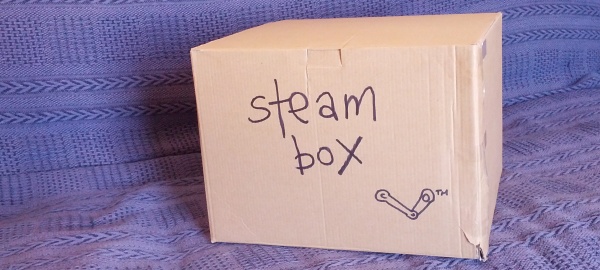Valve Announce Steam Machines With Specs And Prices
Powered by electricity, not steam.
The Consumer Electronics Show is happening in Las Vegas right now, which is a lot like E3 but full of televisions and Michael Bay instead of videogames. There is at least one thing there of interest to us, though: Valve have been revealing the first concrete details of their Steam Machine partners, including the 14 manufacturers currently making them and the specs and prices of some of those boxes.
Nathan is at the event and we'll have interviews and impressions to share with you soon, but let's round-up the news so far.
The manufacturers confirmed thus far are Alienware, Maingear, CyberPowerPC, Gigabyte, Digital Storm, Alternate, Falcon Northwest, iBuyPower, Materiel.net, Next, Origin PC, Scan, Webhallen and Zotac. I have heard of about four of those before, because I am a tech expert.
The machines and specs announced vary wildly, ranging from CyberPowerPC at the cheapest with a console-equivalent £305/$499 model and Falcon Northwest Tiki at the most expensive, with a version that'll set you back £3662/$6000.
The size and purpose of the machines changes too. The Maingear Spark is a 2"x4.5" box with laptop parts inside, obviously most useful as a streaming box, while the Webhallen build looks like a fridge. There's a full list of specs at the, er, Metro site.
Steam Machines are living room PCs which will run Valve's SteamOS and help you play games on your TV, either directly or by streaming your games from another SteamOS-enabled machine elsewhere within your house. They're joined by Valve's own Steam Controller, which replaces the traditional dual analogue sticks with two sensitive touchpads with haptic feedback. The hope is that, eventually, Steam Machines can free your games from both the desktop and Windows, and allow you to play mouse-based games while reclining on your couch.
Valve sent out their own Steam Machine prototypes last year to 300 beta participants, which resulted in a lot of excited benchmarking videos and the like. While Valve eventually aim to manufacture their own Steam Machine, the partners they've teamed up with will be first to market and the aim is to offer as much choice to gamers as possible.
We want to do the same around RPS, so remember that our own Steam Machine is still in development.
These machines may optionally free us from Windows SteamOS as they're built on Linux, specifically Debian. That means they'll only run Steam games that are currently built to run on Linux systems, and while the last few years have been great for the penguin, that's still far fewer than the total number of games available on Steam. You can of course pop Windows on a Steam Machine easily, but you'll be missing out on most of the functionality that makes them unique, which feels rather like missing the point.
Nathan has been chatting with Valve, so we'll have more for you soon.


